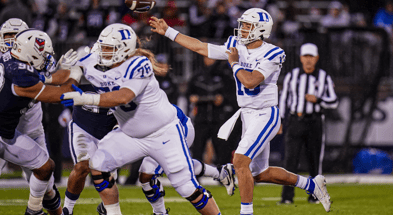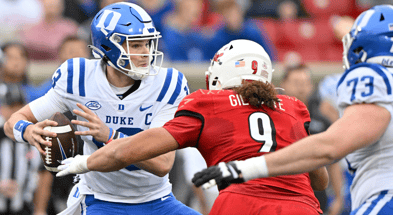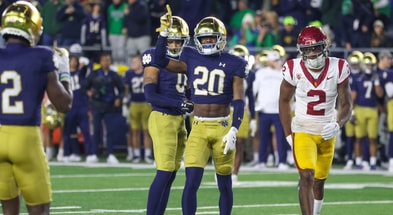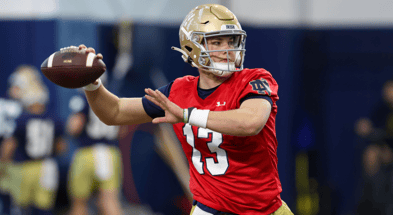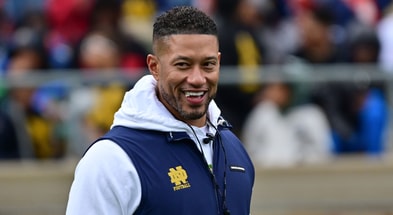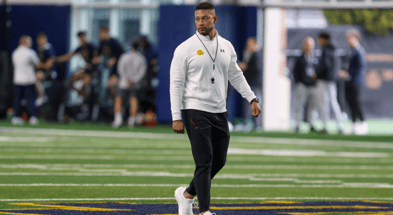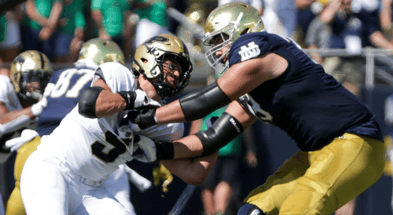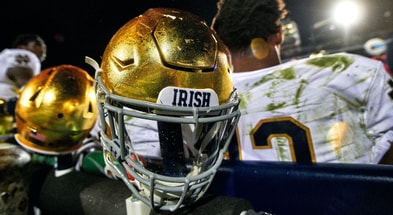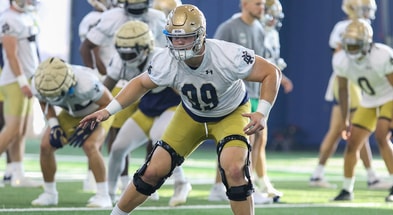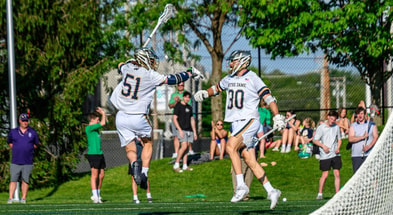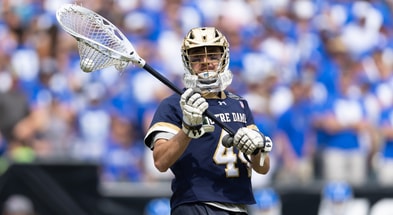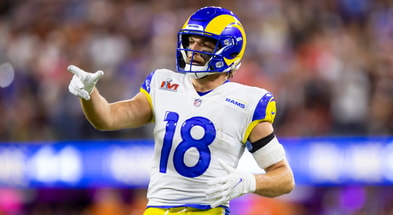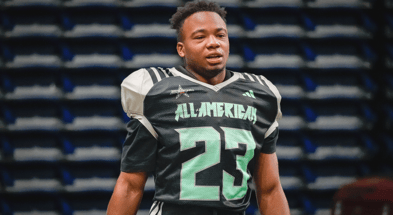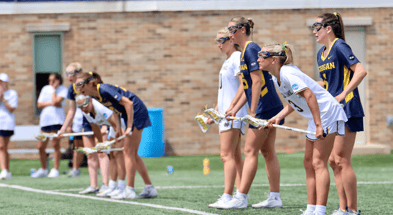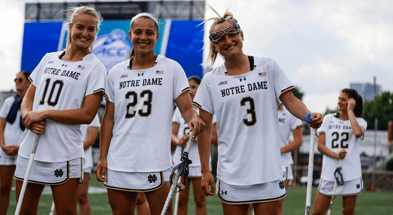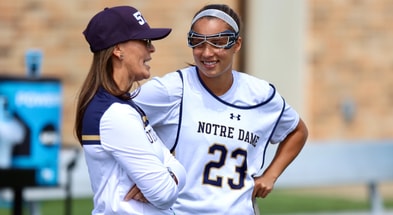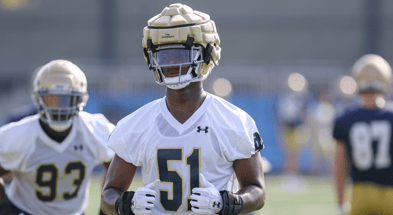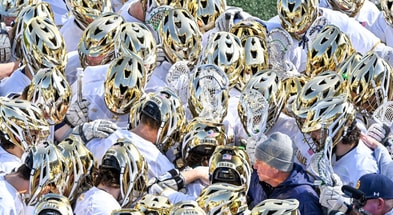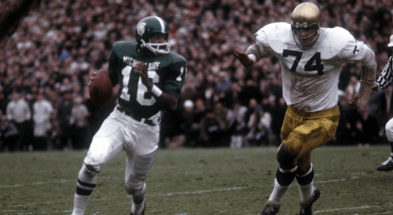Everything Notre Dame director of athletics Jack Swarbrick said on ‘Wake Up the Echoes’ show
Notre Dame director of athletics Jack Swarbrick appeared on the University’s “Wake Up the Echoes” show Tuesday. He spoke about rebuilding the football program, its current state, stadium renovations, the College Football Playoff and more.
Here’s everything Swarbrick told host Tony Simeone during Episode 9. Quotes have been lightly edited for length and clarity.
On what he anticipated his role with the football program when he began and how it met/exceeded expectations:
“Well, the day I was announced, a very good friend, Notre Dame alum, Michael Browning, called me and said, ‘You realize you only have one job, right?’ And I said, ‘What do you mean?’ He said, ‘It’s football. You got to get that right.’
“It was good counsel. But I knew coming in that there was an open question about the future direction of the football program that I needed to resolve. I needed to evaluate the program and decide what we were going to do. That was the first major task.”
On the memories of the football team:
“Well, the first is foundationally getting ourselves in a position for that success, right? Because I agree with you, one year aside, it has been a consistently high-performing program. It’s among a very small number who have made the CFP more than once during my time. I’m proud of that.
“But the challenge initially was to fix the foundation. It was broken. Everything about it was off. And part of hiring Brian Kelly was trying to find somebody who’d built a program. But then also going about supporting the program by adding on the elements. Growing it the way it needed to grow, to be able to be competitive in the environment it was in.
“We were nowhere in nutrition. We had to build that up. And we were nowhere in sports science. We had to build that up. We lacked the right facilities, and on and on and on. Sometimes, you’re just about needing to bring in a new coach. Sometimes, you’re about we need to rebuild the program. That’s where we were. So, the big overview takeaway for me, as I reflect on it is, we got that done. Foundationally, this thing is really strong.”
On being proud of the Notre Dame Stadium renovations:
“A dear friend and colleague, John Affleck-Graves, the Executive Vice President for a long time here, great guy, who has served this university so well, took me aside once and said, ‘Whatever you do, do not come forward with a plan to add premium seating to the stadium. It’ll cost you your job.’ That was like meat to a dog. I was just like, ‘Alright, I know what I’m going to do now.’
“It was a good caution, right? You couldn’t just do that. That wasn’t Notre Dame. So, I actually started by thinking about how to create a home-field advantage. Because I got so frustrated after every game here, the opposing AD (athletic director) would come up to me and say, ‘Boy, we love playing here.’ I said, ‘I don’t want you to love playing here. I want you to hate playing here.’ It started down a path of how do we make it a harder venue to play in? But in the course of thinking about that, I realized that wasn’t the issue at all.
“It was a real estate question, and that campus had grown up around this stadium. (Knute) Rockne built it way off campus, way off campus. Even when I was here a million years ago, you felt like you needed to pack a lunch to go to the football stadium. And the campus had grown up around it. So the real question was, ‘How do you take that venue and make it useful to the University year-round rather than 10 days a year?’
“That’s what led to the vision of adding the initial proposal was four buildings, including one on the north side. It was going to be a low building. The original plan also had a bridge over the Joyce Center, which, on cold days, I miss. But yeah, that was the notion, right? Make it a really compelling building on a year-round basis for the students, faculty and visitors to campus. And we achieved that.”
On the impact of Notre Dame Stadium’s video board and the installation pushback:
“Oh, there was enormous resistance. It was sort of an absolute can’t go there point for a lot of people. They thought it would ruin the feel of the stadium, the history of the stadium. The good news is we could point to Wrigley Field and Fenway Park and say, ‘I think they’re still pretty great facilities, and they’ve got phenomenal video boards.’
“But the way we sold it was sort of a Notre Dame way. We said, ‘Look, we think we need it for football to create the right environment. But think of all the other things we do during the game that get lost. We bring a faculty member out on the field and honor them, and no one’s paying any attention. We announced the Mass schedule, and no one’s paying attention.’ Heck, now that Mass schedule announcement is one of the highlights of the game with Father Pete. Everybody goes crazy.
“It was the reinforcement that we’d use it not just to add to the excitement of the game but to send Notre Dame messages. Also, we wouldn’t use it for commercial purposes; there wouldn’t be any advertising on it. So, it was helping people understand there could be a way to do it that fit with Notre Dame.
“We actually had a recruit come in early in my time here who, on his visit to the stadium, said, ‘You guys can’t be very serious about football because there’s no video board.’ And I thought, ‘He’s right. That’s the impression we’re going to create here.’ The first time I saw one of our players running for a touchdown, watching the video board to see where the pursuers were, I was so proud. I thought, ‘Man, that’s great. We helped score a touchdown.’
“We do the same thing everybody else in the world does, but our coaches have preferences for what they can see on the video board, right? So, we’re careful to okay, ‘You want this angle so you can evaluate this part of what we’re doing, we’ll show you that angle.
On navigating playing through the COVID-19 pandemic:
“It wasn’t nearly the toughest, but it was among the most frustrating because there was so much bad information floating around, and I thought that decision-making was so askew in a lot of places. We were on Zoom calls every day — conference or CFP. It was challenging.
“The great thing was being at Notre Dame and having the clarity that this place has. When Father John (Jenkins) announced we’d come back to school, for me coming back to school met we’re playing sports. It’s part of Notre Dame. If we’re coming back to in-person education, part of that in-person education includes playing sports.
“Our decision was pivotal to the college football season. I don’t want to overstate it, but you had the Big 10 and the PAC 12 say, ‘We’re not playing. The ACC, SEC and Big 12 had a working agreement that if any of them decided not to play, the other two wouldn’t. That really came down to us.
“I had a reporter call me during it and say, ‘I’m going to ask you whether you’re going to play football this year. But I want you to know, you’re the 12th AD I’ve called, and the first 11 said, ‘It depends on what Notre Dame does.’ I felt I had clear marching orders based on the university’s decision, and we went forward. I took personal offense to people who thought we weren’t being responsible. We thought the better evidence was we could go forward safely, and time proved us right.”
On the 12-team College Football Playoff:
“I’m very excited about the future of the CFP. I must say, that four-person working group that I worked with for a year and a half, Greg Sankey, the Commissioner of the SEC, Craig Thompson, Mountain West, and Bob Bowlsby, the Big 12, was about the most enjoyable committee assignment in my world’s full of committee assignments that I had in my time here.
“They were great colleagues, great to work with. Nobody brought prejudice into the room. We just worked our way through hundreds of models to come out to the one we came out to.
“I’m excited about it. One of the things we did was mapped out the prior 12 years with every model we developed. When we look back at this one and said, ‘Boy, look at these first-round matchups. These are going to be extraordinary. Then, the quarterfinals they led to, it became a compelling model for us. But I’m so excited; you’re going to get some first-round games that are just unbelievable.”
On the possibility of Notre Dame hosting a playoff game:
“I think we’re going to have some memorable games, high stakes games that we get to host. We gave up the right to get a bye as part of getting this model adopted. But the result is we’ll probably be a first-round host more than most institutions.
“It will be an interesting time of year to host. Campus will be closing, and the weather will be challenging. But I think it’ll be a great football environment.
“As part of this process, some of my colleagues developed a concept that the host institution could, at its option, relocate the game somewhere else if it chose to. These were all schools or institutions working on the assumption that a northern school would want to go somewhere, like to an indoor venue, if the weather was bad. I’m thinking, ‘Oh, no, That’s sort of perfect. Give me 12 inches of snow, and let’s go.’
On where he wants the Notre Dame football program to be under coach Marcus Freeman:
“We need to win a national championship, and we shouldn’t be shy about articulating that. We got off track a little bit. It’s taken some time to sort of rebuild that foundation and get it right.
“But we have the right head coach. I think we’ve got the best stadium in the country. I think we’ve got the best indoor practice facility in the country. We will address the football operations center next, and when we do that, we’ll have the best complement of facilities for anybody. So we’ve got all the pieces.
“I personally feel more strongly today than the day I made the decision, but I think we got the right head coach to take us there. There are a lot of things I’ll miss, as I approach the end of my time here, but not being there when they win that national championship will be high on the list.”
On watching Notre Dame games as an alum rather than director of athletics:
“As people, students I know or people I hired and part of the program. You’ll have that view. I haven’t decided yet whether I’ll come back, right? It’ll be challenging for me to sort of work through that. I may be better off sitting at home throwing things at the television.
“I mean, listen, this has been the privilege of a lifetime. Doing it at your alma mater is special. Doing it at this place is incredibly special. So it’s been great. The people I’ve gotten to work with. The problems I’ve gotten to try and solve. It’s all just been so great. It is the privilege of a lifetime.”

